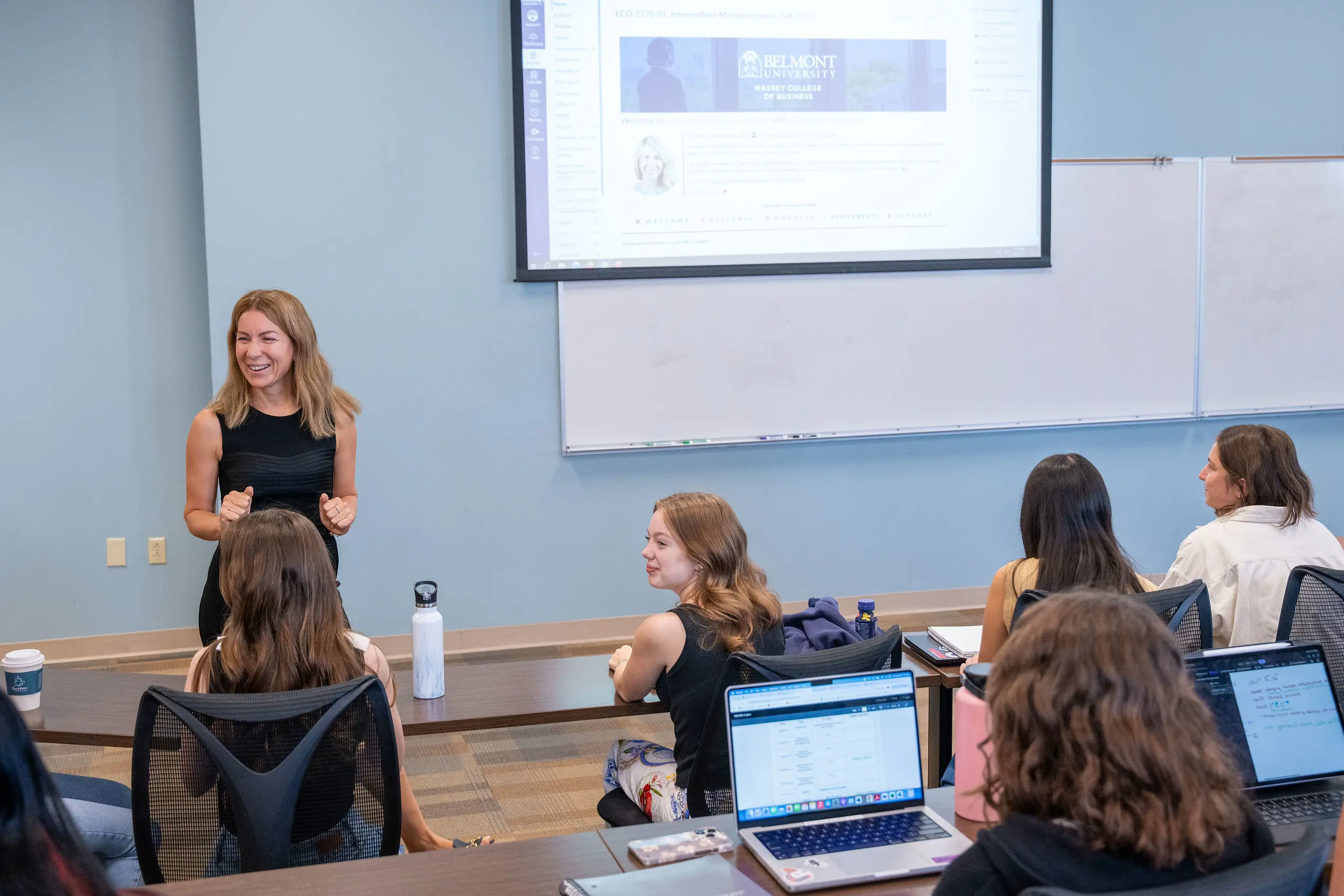Economics majors gain real-world experience and can pursue diverse, high-earning career opportunities.
Given the nature of economics, the options and opportunities for students are many. Studying this discipline gives students an understanding of the national economy and equips them to think critically about problems in the business world. Whether you are interested in diving into research, pursuing a graduate degree, attaining a high paying job or understanding global challenges, studying economics at Belmont will leave you more than prepared to achieve your goals.
This guide explores eight compelling reasons why studying economics is more relevant than ever. Read on to find the answers to your lingering questions about economics and learn a few things you didn’t think to ask!

What is Economics?
In general, economics is about people. It’s the decisions they make as individuals, the markets they create and the complex interactions between them. Economics is often divided into two main sectors:
- Microeconomics focuses on individual choices and markets.
- Macroeconomics looks at the whole economy, including issues like inflation, unemployment and economic growth.
At its core, economics is the study of how people use limited resources to meet unlimited wants.
8 Reasons to Major in Economics
Plus, the insights you gain from economics are valuable every day, no matter your path. As you look at colleges, you want to find an economics program with outstanding faculty, hands-on research opportunities and a curriculum that prepares you for graduate school and real-world decision-making.
1. Diverse Career Opportunities
Economics majors are in high demand. Aspiring economists can find jobs in various fields, such as government, finance, policy, business, accounting, nonprofit, sales, medicine and consulting, to name a few. Employers search for candidates with both macroeconomic and microeconomic knowledge to strategically advise in or lead the making of investment and business decisions. According to the U.S. Bureau of Labor Statistics, jobs in economics are projected to grow 22% from 2024 to 2034, more than seven times the average growth rate for all occupations, reflecting strong demand for economic analysis and quantitative skills across many industries.
With the rapid growth of technology, it’s common to make career changes throughout life. An economics degree positions you to adapt and advance as technology continues to reshape the job market.
Possible Jobs for Economics Graduates
- Actuary
- Budget Analyst
- Business Intelligence Analyst
- Financial Analyst
- Global Policy and Research Associate
- Infrastructure Economist
- Legislative Director
- Market Research Analyst
- Public Relations Strategist
2. High Earning Potential
The U.S. Bureau of Labor Statistics reports that the median wage for economists is $115,440 as of May 2024. Careers in economics often come with strong growth prospects and a high level of job stability. Many economics graduates find opportunities not only as economists but also in finance, policy, analytics and business, which can further enhance earning potential.
3. Positively Impact Society
Economics benefits society by equipping individuals with the knowledge to understand and address challenges like poverty, inequality and resource allocation. With an economics degree, students gain the tools to analyze societal trends, inform public policy and help create practical solutions that improve communities. Economics is important because it provides a framework for impacting real societal change. Whether within government programs, corporate strategies or personal finances, an economics degree empowers graduates to play an active role in building a more just and prosperous world.
With economics, you’ll gain the tools to see the world more clearly and play an active role in improving it.
4. Real-World Experience
At Belmont University, you’ll gain real-world experience including valuable research, internships, extracurricular activities and student organizations.
Economics students can apply classroom learning outside of class through:
- One-on-one research alongside expert faculty, gaining personalized mentorship and hands-on experience that deepens your understanding and hones your skills
- Participation in the interdisciplinary Scholarship, Performance, Art, Research and Knowledge (SPARK) Symposium
Students may also join organizations including:
- Omicron Delta Epsilon Honor Society, which recognizes scholastic achievement and promotes excellence in economics
- Data, Mathematics and Computing Association (DMCA), a student-led group for those interested in data science, mathematics, and computing disciplines
By majoring or minoring in economics, you’ll build skills and gain practical experience, preparing you to solve real-world problems in business and society.
5. Economics is Everywhere
Economics is a part of everyday life, influencing the many choices individuals make each day. From deciding how to spend limited money and time, to weighing the benefits and costs of different options, economics helps explain why people prioritize certain needs and wants over others. Understanding these decision-making processes reveals how deeply economics shapes our daily routines and personal choices.
6. Flexibility In Your Degree Path
Many economics programs provide students with options to customize their education to fit their interests and career goals. Typically, students can choose between degree tracks like a Bachelor of Business Administration (B.B.A.) with comprehensive business curriculum, a Bachelor of Science (B.S.) which emphasizes quantitative and analytical skills or a Bachelor of Arts (B.A.), which offers a broader liberal arts perspective. This approach prepares students for a well-rounded and flexible career path, equipping them to adapt and transition across diverse fields such as business, government, research, and international affairs throughout their working lives.
At Belmont University, this flexibility is reflected in offering both a B.B.A. and a B.S., allowing students to align their studies with their professional aspirations.
7. Develop Analytical Thinking Skills
An economics degree teaches students to think critically and analytically by breaking down complex problems, evaluating data, and applying economic theories. These analytical skills are highly valued across industries, enabling graduates to make data-driven decisions and develop effective solutions in business, government, and research. Through coursework and hands-on experience, students gain proficiency in interpreting empirical evidence and honing problem-solving abilities, which also provides a strong foundation for advanced studies and leadership roles.
8. Prepare for Graduate School
An economics degree provides a solid foundation for graduate study by equipping students with critical analytical, quantitative and research skills essential for advanced education in economics, business, law, public policy and related fields. Through rigorous training in economic theory, mathematics and econometrics, students develop problem-solving abilities and empirical techniques that form the core of graduate curricula. This preparation not only helps students excel in graduate programs but also gives them a competitive edge when applying to selective schools and professional programs.
Graduate programs provide excellent opportunities for students to deepen their knowledge and develop advanced skills that prepare them for specialized jobs and leadership roles across various industries. These programs also give individuals enhanced qualifications, allowing them to stand out and be considered for more selective and prestigious positions.
No matter the path, holding an economics degree provides a strong foundation and essential technical background that significantly contributes to success in graduate education and competitive professional fields.

Why Should You Choose to Study Economics at Belmont?
Choosing to study economics at Belmont means gaining a rich, personalized academic experience grounded in real-world applications and access to dedicated faculty. The program encourages critical thinking about economic systems and their potential to create meaningful change.
"The economics program at Belmont has opened so many doors for me. I realized how much I love thinking critically about the economic systems that both shape our world and have the potential to make it a better place. Economics has allowed me to explore the intersection of policy, sustainability and human behavior. The economics program here is personal, challenging and rewarding."
Economics FAQs
If you’re interested in a broader overview of business functions like marketing, management and entrepreneurship, general business may be the right fit. If you're more curious about how markets work, what drives economic decision-making and how policy shapes financial systems, economics might be your path. It just depends on what fits you best!
Below are a few of the classes you’ll get to take as an Economics Major.
- Principles of Macroeconomics
- Healthcare Economics
- Comparative Economic Systems
- History of Economic Thought
- International Economics
- Global Managerial Economics
Economics is an equally challenging and rewarding major, especially for students who seek strong analytical and mathematical skills. This rewarding knowledge of complex economic systems and gaining problem-solving skills makes the long hours and hard work all worth it.
Turn Potential into Possibility
Students who graduate with an economics degree are prepared for their careers, equipped with knowledge and abilities for the industry. Consider applying today!
Learn More
Learn more about economics at Belmont.


